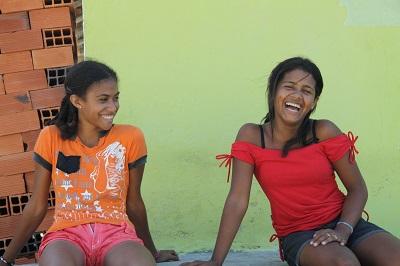A Better Life in the Favela

The community of Monte Azul makes it possible
Before a trip to Brazil, everyone likes to gather information about the country and its people. The news page supports this by regularly reporting about curiosities and news. Interesting and exciting facts about the Brazil vacation are thematized by us.
Now we present a social project in Sao Paulo, the Associacao Comunitaria Monte Azul (community "Blue Mountain"). What is behind it?
Monte Azul was originally a poor residential area (favela) in the south of the metropolis. The favela became the eponym and home town of the community association, which is committed to improving the living conditions of its inhabitants.
The German teacher Ute Craemer founded the Comunitaria Monte Azul over thirty years ago. What made her do it?
Ute Craemer first came to Brazil in 1966 for the German Development Service. In the state of Parana, she looked after the children of the destitute rural population. Later she moved to Sao Paulo in the neighborhood of the favela Monte Azul to teach at the Rudolf Steiner Waldorf School. Soon, favela children began begging for alms at her front door. Ute Craemer then developed an exchange project between her students and the needy children. She aimed to help the destitute on the one hand and to open the eyes of the children of the Brazilian middle and upper classes to the realities of their country on the other. The playing and working together initially took place in Ute Craemer's house, which soon proved to be too small. Through contact with the little ones, the teacher also got to know the adult inhabitants of the favela. After a lively exchange of ideas, Ute Craemer founded the association of the same name in 1979 together with the inhabitants of Monte Azul under the motto "Help for self-help". This was an innovative advance at a time when industrialized countries were providing significant development aid instead of promoting self-initiative. Ute Craemer herself puts it this way: "The most important thing is to believe in people. Even in the most miserable ones. This trust acts as a bridge between the spiritual and the earthly world".
The fascinating personality and presence of Ute Craemer have led to the fact that meanwhile more than 1,350 children and young adults are being supported in three favelas in the south of Sao Paulo. The slums are considered to be pacified. There is health care, kindergartens, music lessons, adult education, theater, libraries, and much more. In total, about 20,000 people benefit from the support of the association. The Associacao Monte Azul was awarded the "Premio Bem Eficiente" for efficiency and honored by the Brazilian Bank Itau and UNICEF ("Premio Itau-UNICEF"). The city of Sao Paulo now finances almost half of the project. The remaining costs are covered by donations and the sale of their products from bakeries, carpentries, or art workshops.
Organizations like Monte Azul are very important for the social development of an emerging country, as they have a direct positive influence on the living conditions of the people. Overall, there are high-income disparities in Brazil. A geographical dividing line can be drawn right through the middle of this huge country. In addition to the favelas in the large conurbations, the Brazilian northeast is the home of the economically underprivileged. In the south, it is mainly the wealthy Brazilians who live there. Nevertheless, northeastern states like Ceara or Maranhao enchant with impressive natural landscapes and heavenly beaches. The two national parks Lencois Maranhenses and Jericoacoara are highlights of a Brazilian vacation.
Source: monteazul.de

